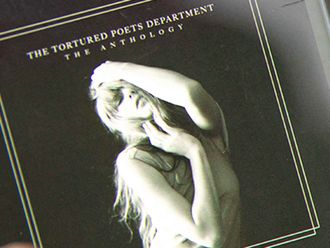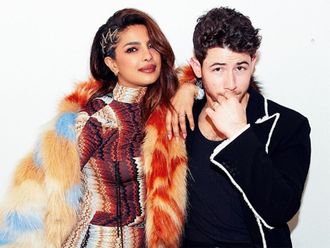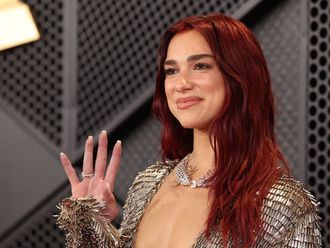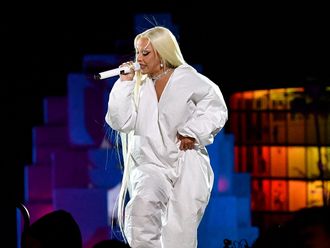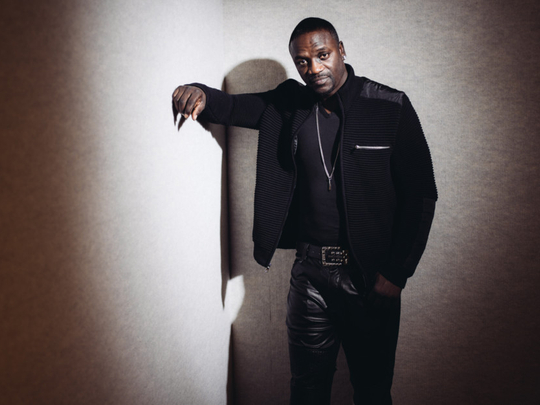
Akon, an R ’n’ B star who’s collaborated with everyone from Eminem to Andy Samberg, is about to release his first albums in seven years — but you won’t find them in stores or on streaming services like Spotify. Instead, he plans to release four albums through a new app, making him the latest artist to experiment with bypassing big record labels and traditional music distribution altogether.
The new app, called Stadium, will let fans stream Akon songs for free, although they’ll have to put up with ads. But interacting with the app by clicking the ads or sharing with friends on Facebook will earn users credits they can use to “buy” digital goods such as ringtones, wallpapers and Akon-styled emoji. And, of course, to unlock more songs and unreleased videos.
“It’s going to definitely regenerate the music business,” Akon said in an exclusive interview with The Associated Press, calling his app “the answer” to the music industry’s problems. “It’s going to take someone like me to take the chance on it.”
It’s not a bad deal for Akon junkies; it lets them stream otherwise unavailable new music legally from their smartphones. For artists like Akon, this kind of independent digital route offers other major advantages — among them, sidestepping Spotify, Pandora and their ilk. Many musicians resent those services for offering what artists consider a tiny cut of streaming revenue.
That’s a big issue in the music industry, where sales of downloaded music are falling while streaming is surging. Services like Pandora and Spotify argue that they give out the majority of their revenue to artists and labels and the amount will only grow as more people stream.
Artists’ own apps, however, can garner them a greater slice of ad revenue, while also scooping up data on which songs fans like most and where they live. Musicians can use them to sell concert tickets, backstage passes and T-shirts and other merchandise.
By appifying himself and going independent, Akon aims to super-serve his 60 million-plus fans on social media. He said that roughly 200,000 people have already registered to receive the Stadium app when it’s released in the next couple of weeks.
Other artists have gone down a similar road. Radiohead released In Rainbows as a pay-what-you-want album download in 2007. Lady Gaga debuted songs from Born This Way on a special version of the video game FarmVille in 2011, and last year U2 released Songs of Innocence as a free album to iTunes users, sponsored by Apple. Some acts — like Macklemore, Nine Inch Nails and The White Stripes — have foregone traditional record-label deals and thrived.
But none of these efforts have yet yielded a broadly viable way of getting music into the hands of fans while paying artists what they think they deserve.
Streaming music, meanwhile, is exploding. It’s on pace to double this year, according to Nielsen Music data, gains that would propel US “album” sales upward for the first time in four years. (Nielsen counts 1,500 song streams as equivalent to an album sale.) Streaming is “a huge piece of the business,” said David Bakula, senior vice-president of analytics at Nielsen.
Akon’s first four albums for the Stadium app will each hew to a different genre: world, house, urban and reggae. The last album, in the pop genre, will be released sometime before March next year, likely in standard formats on multiple digital and physical channels through Warner Music Group’s Atlantic Records, Akon said.
Warner said it was too early to comment on its plans.
Vickie Nauman, a Los Angeles-based digital music consultant, says more artists should experiment with offerings like Stadium. Major streaming platforms, she says, are often incredibly cluttered, given that they can offer 30 million or more tracks. She argues that streaming is also too expensive, since the $10 (Dh36.7)-per-month on-demand plans like Spotify and Apple Music are roughly double what consumers have traditionally paid for music.
“Until we meet consumers where they are, at a price point they’re willing to pay, and a user experience that has value, we won’t have mass adoption of streaming,” Nauman said.
The Stadium app was developed by EscapeX, a New York startup that launched in July. It has made white-label apps for artists such as Karmin and plans to also release new music in new apps for the estate of Bob Marley and DJ Armin Van Buuren. Artists that own their music, as in Akon’s case, keep 70 per cent of the revenue. Otherwise they have to divvy that share with other rights holders.
EscapeX CEO Sephi Shapira says artists need to tap into the economy of engagement instead of hoping more people will pay for music. “Ninety-five per cent of people will never pay for a subscription service,” Shapira said. “We’re telling artists to come join this economy.”
Akon said his cut of streaming revenue will be far better than on popular platforms like Spotify or Pandora. “You’ve got a fraction of a penny with them, and you’ve got cents over here,” he said, noting that songs like Sexy Chick and Lonely have collectively been streamed more than a billion times since release.
“Just think about it,” he said. “Why give someone like Spotify or Pandora 99.9 per cent of what should go in your pocket? It doesn’t make sense.”
Back in 2010, you said Stadium would come out that year.
Unfortunately there was a lot of changes happening within the Universal (Music) building. They were restructuring. And my project unfortunately got caught up in the midst of it. In the meantime, I was building the Konvict Africa brand, releasing artists such as P-Square and Wizkid. As that was happening I also got involved in energy, and started the Akon Lighting Africa project. I started realising how much the music played a role and offered me the opportunity to branch off outside of music to become successful in other areas. So it was about that time that I wanted to focus on the album. I recorded so many songs. The biggest challenge was: How am I going to release this?
So, you decided to release them via an app. How did that idea get started?
This is going to be the first time ever done in the history of music. I had a friend named Dada Mills who was working with a company named EscapeX. Together we came up with a formula, pretty much called the “app album.” I’m releasing multiple albums on my platform, an urban album, a world music album, a house album, a reggae album called the Island album, and the pop album, which we’ll probably release off the platform, which will create more marketing to lead you back to the app itself.
So the pop version will be downloads?
The pop version will be released through a record company (Atlantic). That’s the way of tying the app in with the majors.
How did the label feel about the idea?
From the moment I explained it, they were all in. There were like, well at least just give us one so we can be attached to this thing somehow. They understand the power of digital. They’re like, the fans are the ones who create this success in the first place, so if you have the fan base, then guess what, you have the buyers. As long as you have buyers, you can sell them anything, it doesn’t have to be music. It can be headphones. Just ask (Beats co-founder) Jimmy Iovine.
What about Apple Music? Does the pop album go there as well?
Yeah, the pop album will go to all the traditional sources. The way I look at it is, as long as we can capitalise on all those resources, that’ll be the way to market and promote four albums. One hand washes the other and both hands wash the face.
How do you feel about how artists are compensated through streaming platforms?
No artist is happy with how they’re getting paid from the streaming platforms. Outside of subscription models, there are other models. Look at Facebook. How do they make billions? When you look at this app, my fans are doing exactly what people are doing on Facebook. The only difference is they’re going to be on my app a lot longer.
Other artists like Karmin are on this platform. Ads churn through and you don’t have to do anything.
The crazier part of it is it doesn’t interrupt anything. You can actually choose if you even want to see the ads.
How important is it for you to own the app versus having free streaming on Spotify free or other platforms?
From a business standpoint it doesn’t make sense. Why give someone like Spotify or Pandora 99.9 per cent of what should go in your pocket? Also, you don’t get the data. And the data is the most important part.
How much better is it for you if someone streams on your app vs Spotify free?
You’ve got a fraction of a penny with them and you got cents over here for a streamed song. Start multiplying that by millions of people and billions in some cases. Just think about it. One record me and David Guetta did called Sexy Chick has almost a billion streams to date. People are always going to stream. It goes back to the role of the artists, because now they feel like being part of the business. The business is set up for the corporation to make money and the artist just to work. Now the artist is getting a bigger piece of the pie.
How do the albums get released?
When you get the Stadium app, the world music album will be unlocked. According to your participation, you earn “acorns” to be able to unlock the next album and the next album until all four albums are unlocked.
What’s the amount of time you have to spend on it?
That depends on the listener. It’s almost like a game. Unfortunately you can cheat the game. Just put on the app, press play and leave it on your dresser for three to four weeks and come back and it’s unlocked.
Why release the pop album the standard way?
Eventually the goal is to make the app a formula that even the majors can use. The majors are trying to figure out how this works. So the Stadium app will be a way of allowing them to understand what this is.
It’s interesting to release the music a bit at a time.
It’s like walking into a buffet. You can only fill your stomach to a certain level and then you get full. So we’ll give them just enough to be able to get full long enough to look forward to the next meal.
Is there a magic number you have to hit before the pop album comes out?
I think you jinx yourself when you do that. But I’m highly confident that once this comes out, it’s going to create a new wave. It’s definitely going to regenerate the music business. I think this is the answer to the problems the majors are dealing with. And it’s going to take someone like me to take the chance on it. I’ve been gambling on myself since Day 1, so this is not new for me.



